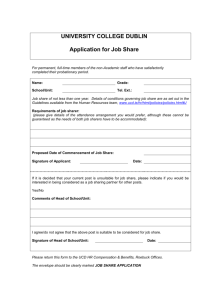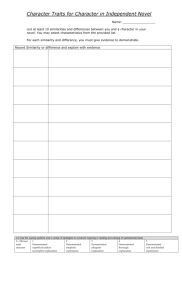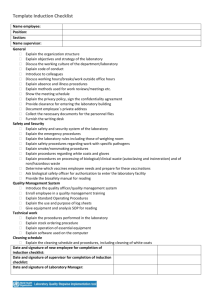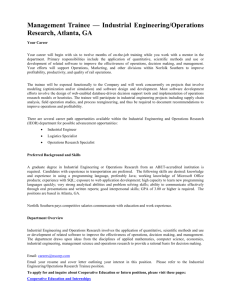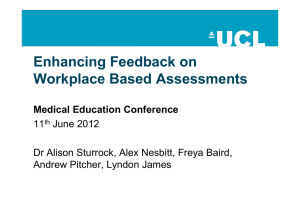Supplemetary Checklist for DOPs - Demonstrates aseptic peripheral
advertisement
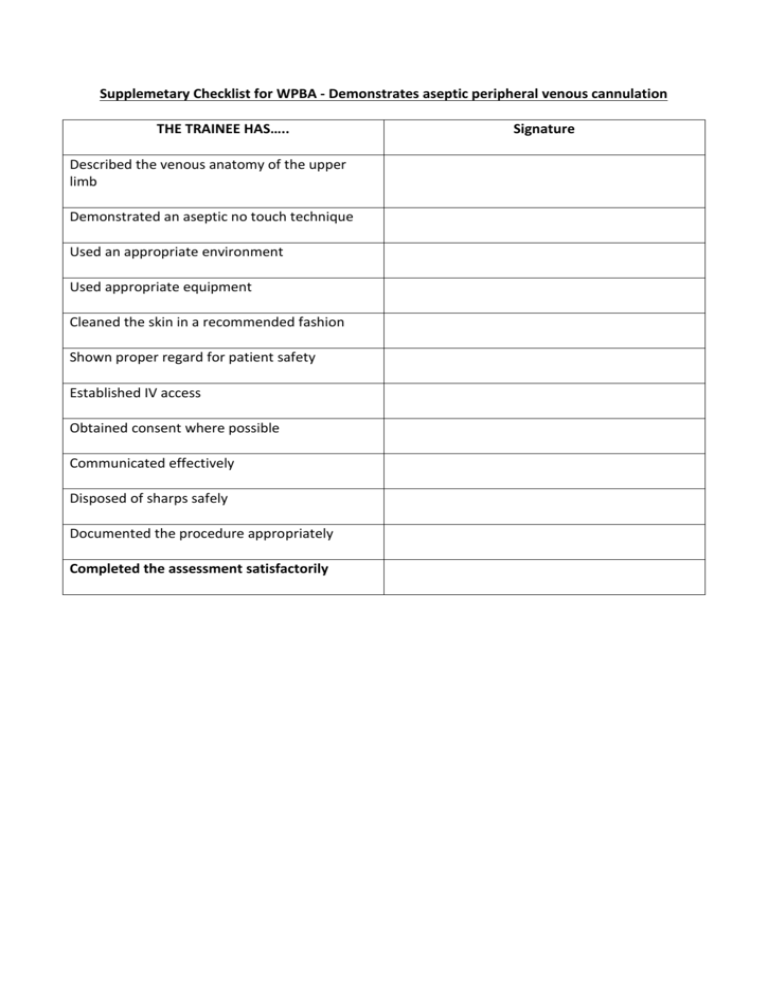
Supplemetary Checklist for WPBA - Demonstrates aseptic peripheral venous cannulation THE TRAINEE HAS….. Described the venous anatomy of the upper limb Demonstrated an aseptic no touch technique Used an appropriate environment Used appropriate equipment Cleaned the skin in a recommended fashion Shown proper regard for patient safety Established IV access Obtained consent where possible Communicated effectively Disposed of sharps safely Documented the procedure appropriately Completed the assessment satisfactorily Signature Supplementary Checklist for WPBA - Demonstrates aseptic arterial cannulation (+ local anaesthetic) THE TRAINEE HAS….. Successfully completed the tutorial ‘arterial canulation’ which fulfils all knowledge requirements Successfully run through a disposable transducer system Performed arterial cannulation using the transfixion or Seldinger technique. Demonstrated the ability to attach transducer system and zero the transducer Cleaned the skin in a recommended fashion Shown proper regard for patient safety Obtained consent where possible Communicated effectively Disposed of sharps safely Documented the procedure appropriately Completed the assessment satisfactorily Signature Supplementary Checklist for WPBA – Obtains an arterial blood gas sample safely, interprets results correctly. THE TRAINEE HAS….. Demonstrated an understanding of the need for appropriate communication with the patient arterial blood gas sampling, including but not limited to: Appropriate explanation to the patient Obtaining implied or explicit consent Used appropriate skin cleaning methods and the currently recommended cleaning agents. Used appropriate sterile techniques. Used a heparinised syringe. Calculated the anion gap and recalled causes of increased and decreased anion gap. Safely obtained an arterial blood gas sample using either the radial or femoral route. Compressed the artery following sampling. Correctly interpreted results Recorded the results in the patient record Completed the assessment satisfactorily Signature Supplementary Checklist for WPBA - Demonstrates aseptic placement of a central venous catheter. THE TRAINEE HAS….. Successfully completed the tutorial ‘central venous access’ which fulfils all knowledge requirements Obtained consent where possible Used sedation and local anaesthesia appropriately Observed infection control procedures Set up the ultrasound machine, select appropriate depth and gain and applied a sterility sheath. Safely and aseptically performed placement of CVC’s using the internal jugular approach. Maintained safety of environment for patient and health workers including safe sharps disposal Correctly interpreted the post-procedure CXR, confirming correct positioning and excluding major complications. Adequately documented the procedure Completed the assessment satisfactorily Signature Supplementary Checklist for WPBA – Connects mechanical ventilator and sets initial settings THE TRAINEE HAS….. Successfully completed the tutorials ‘Setting the vent and problems’ and ‘Ventilatory modes’ which fulfil all knowledge requirements Set up and performed a circuit check and safety check of the relevant Ventilator Sets appropriate settings including Peak inspiratory pressure or tidal volume i:e ratio PEEP Used appropriate monitoring including pulse oximetry and capnography Communicated target values and parameters to other members of the team and ensures appropriate documentation. Set appropriate alarms Completed the assessment satisfactorily Signature Supplementary Checklist for WPBA – Describes Safe Use of Drugs to Facilitate Mechanical Ventilation THE TRAINEE HAS….. Successfully completed the RCOA e-LA modules: 3_4_7 Sedatives in the ICU 3_4_9 Muscle relaxants in the ICU 3_4_10 Management of sedation in the ICU which fulfil all knowledge requirements Demonstrated the safe handling of equipment used to deliver sedative agents used during mechanical ventilation, including appropriate use of syringe drivers. Practiced safe prescribing of all agents used to facilitate mechanical ventilation. Demonstrated using the Ramsay score to assess depth of sedation. Completed the assessment satisfactorily Signature Supplementary Checklist for WPBA – Describes Principles of Monitoring Respiratory Function THE TRAINEE HAS….. Demonstrated an ability to perform an effective evaluation of respiratory function in the critically ill patient, including but not limited to: Clinical evaluation of the respiratory system Use of respiratory parameters monitored by artificial ventilators, including airway pressure, tidal volumes, minute ventilation, respiratory rates and spirometry Performed immediate (physical) assessment of the respiratory system Ordered and interpreted and acted on investigations appropriately, including but not limited to: CXR CT scans USS Demonstrated ability to interpret capnograph waveforms and pressure volume loops during mechanical ventilation. Exhibited a calm and methodical approach to assessing critically ill patient. Adopted leadership role where appropriate Involved senior and specialist (e.g. radiology) services promptly Completed the assessment satisfactorily Signature Supplementary Checklist for WPBA – Describes the Assessment of the patient with poor compliance during Ventilatory Support (‘fighting the ventilator’) THE TRAINEE HAS….. Successfully completed the tutorials ‘Setting the vent and problems’ and ‘Ventilatory modes’ which fulfil all knowledge requirements Demonstrated appropriate rapid assessment of the patient who is non-complaint with ventilation, and instituted appropriate lifesaving measures until help arrives, including increasing the inspired oxygen settings. Demonstrated the ability to effectively decide when manual ventilation techniques should be used until experienced help arrives. Demonstrated the ability to order appropriate tests and investigations including but not limited to: Chest radiography Arterial blood gas analysis Demonstrated the ability to work as a part of a team and succinctly present clinical details of the situation to senior doctor. Completed the assessment satisfactorily Signature Supplementary Checklist for WPBA – Prescribes safe use of vasoactive drugs and electrolytes THE TRAINEE HAS….. Listed physiological electrolyte requirements in health and in the critically ill patient, and list common causes of electrolyte disturbances in the critically ill. Demonstrated knowledge of commonly available electrolyte solutions, and the advantages and disadvantages of using such solutions. Demonstrated knowledge of the use of potassium containing solutions. Demonstrated knowledge of pharmacology of commonly used vasoactive agents Demonstrated knowledge of the use of vasopressors including but not limited to: Clinical situations when vasopressor agents may be used Problems associated with the use of vasopressor Appropriate levels of monitoring and assessment during the administration of vasopressor Venous access required for the safe administration of vasopressor Performed safe prescription of electrolyte solutions and vasoactive agents. Arranged monitoring of relevant indices Ordered, interpreted and acted on initial investigations Completed the assessment satisfactorily Signature Supplementary Checklist for WPBA – Delivers a fluid challenge safely to an acutely unwell patient. THE TRAINEE HAS….. Successfully completed the tutorial ‘fluid bolus’ which fulfils all knowledge requirements. Appropriately assessed and established the need for a fluid bolus during to an acutely unwell patient. Selected appropriate fluid and prescribed appropriate volumes during administration of a fluid bolus. Effectively assessed the response to a fluid bolus, and made appropriate clinical decisions based on this response. Completed adequate documentation of fluids prescribed and documented the response to any fluid challenge administered. Completed the assessment satisfactorily Signature Supplementary Checklist for WPBA - Describes actions required for accidental displacement of tracheal tube or tracheostomy THE TRAINEE HAS….. Successfully completed a simulator session addressing the displaced or blocked tube. Completed the assessment satisfactorily Signature

